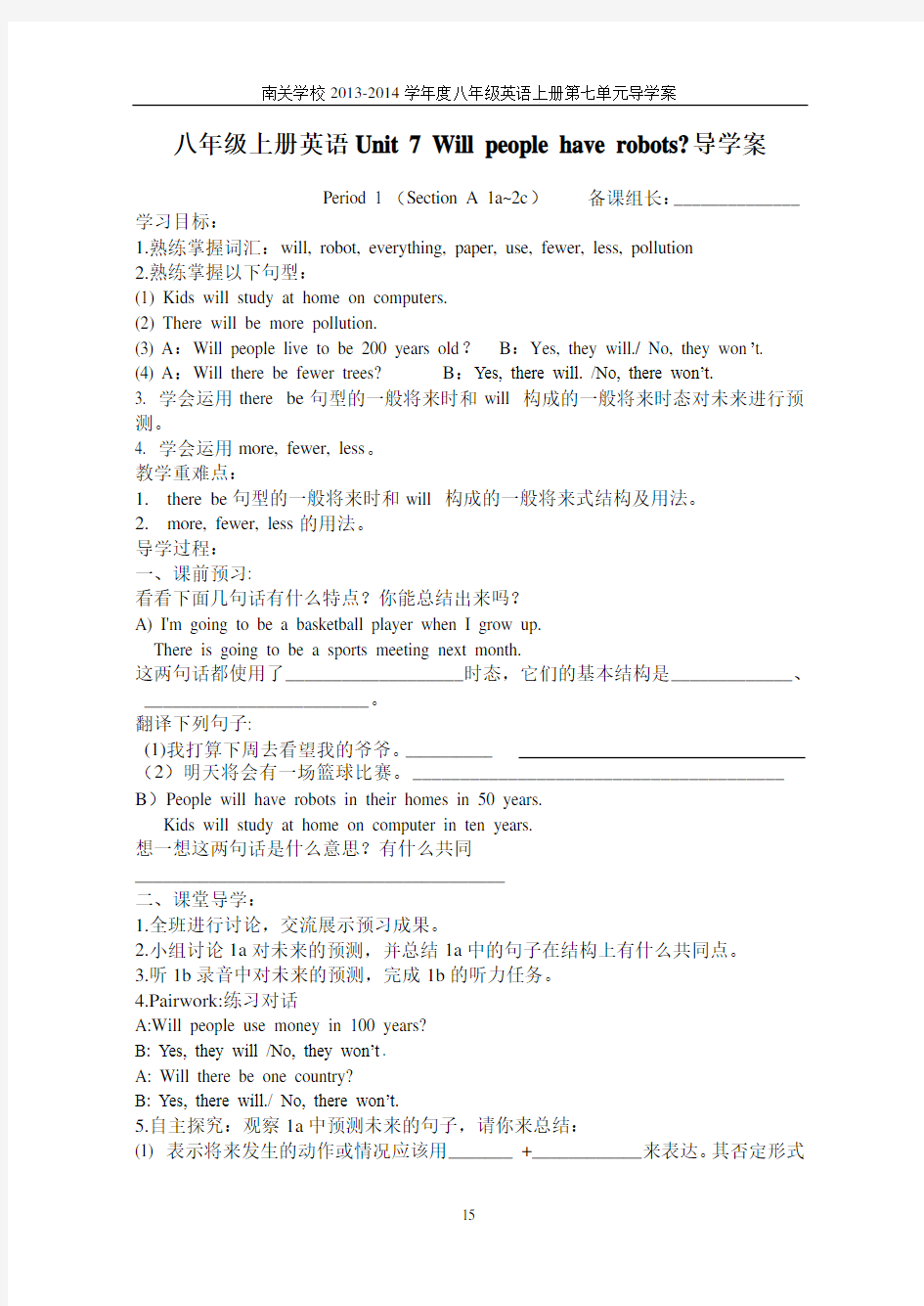
八年级上册第七单元学案
- 格式:doc
- 大小:133.00 KB
- 文档页数:15


八年级上册英语Unit 7 Will people have robots?导学案
Period 1 (Section A 1a~2c)备课组长:______________ 学习目标:
1.熟练掌握词汇:will, robot, everything, paper, use, fewer, less, pollution
2.熟练掌握以下句型:
(1) Kids will study at home on computers.
(2) There will be more pollution.
(3) A:Will people live to be 200 years old?B:Yes, they will./ No, they won’t.
(4) A:Will there be fewer trees? B:Yes, there will. /No, there won’t.
3. 学会运用there be句型的一般将来时和will 构成的一般将来时态对未来进行预测。
4. 学会运用more, fewer, less。
教学重难点:
1.there be句型的一般将来时和will 构成的一般将来式结构及用法。
2.more, fewer, less的用法。
导学过程:
一、课前预习:
看看下面几句话有什么特点?你能总结出来吗?
A) I'm going to be a basketball player when I grow up.
There is going to be a sports meeting next month.
这两句话都使用了___________________时态,它们的基本结构是_____________、________________________。
翻译下列句子:
(1)我打算下周去看望我的爷爷。____________
(2)明天将会有一场篮球比赛。_______________________________________ B)People will have robots in their homes in 50 years.
Kids will study at home on computer in ten years.
想一想这两句话是什么意思?有什么共同
________________________________________
二、课堂导学:
1.全班进行讨论,交流展示预习成果。
2.小组讨论1a对未来的预测,并总结1a中的句子在结构上有什么共同点。
3.听1b录音中对未来的预测,完成1b的听力任务。
4.Pairwork:练习对话
A:Will people use money in 100 years?
B: Yes, they will /No, they won’t.
A: Will there be one country?
B: Yes, there will./ No, there won’t.
5.自主探究:观察1a中预测未来的句子,请你来总结:
(1) 表示将来发生的动作或情况应该用_______ +____________来表达。其否定形式
为___________+____________。你能写出它的疑问句式吗?____________________ (2) There be 句型的一般将来时结构为:______________________,其否定形式为:____________________,一般疑问句式为:_____________________________。
练习:将下列句子译成英文。
①一百年后人们将会拥有机器人。People __________ ________robots in 100 years.
②每样东西都将会免费吗?__________everything __________ __________?
③将来会有严重的污染吗?__________ __________ __________much pollution?
6.听2a,2b录音,完成听力任务。
7.再听一遍录音,完成下面的对话。
Woman: OK, now I want to hear everyone’s predictions about the future.
Girl 1: Well, I think there will be ___________ ___________.
Woman: More people? OK. What else?
Boy 1: I think that there will be ___________ ___________ ___________. Woman: I hope not!
Girl 2: Well, I think there will be ___________ ___________.
Woman: You do?
Girl 2: Yes, people will use the subways more.
Woman: That’s a great idea. Let’s hear another prediction.
Boy 2: There will be ___________ ___________.
Woman: That will be good for the earth!
Girl1: I think there will be _______ _______. And cities will be really big and crowded because there will be a lot more people.
观察与思考:根据所填内容,请你来总结一下:(1) fewer译为_________,是______的比较级,修饰_____________(复数/不可数) 名词。(2) less译为__________,是__________的比较级,修饰__________ (复数/不可数)名词。(3) more译为_______,是_______或______的比较级,修饰________________(复数/不可数)名词。
练习:用fewer, less, more填空。
In 100 years…
There will be _________________ houses. There will be _________________pollution. There will be ________________ schools. There will be ________________clean water. There will be ________________snow. There will be _______________movie theaters.
8. Pairwork:借助2c的对话形式,结合2b内容,两人一组,练习对话。
三、达标检测:
Ⅰ. 将下列句子译成英语。
1. 城市的汽车会更少,地铁会更多。
There ___________ ___________ ___________cars and _________subways in the city.
2. 城市的污染会更少,人口会更多。
There _________ ________ __________ _________ and more people in the city .
4. 这位老人非常健康,他可以活到100多岁。
The old man is very healthy, he can _________ _________ _______ over 100 years old. Ⅱ.句型转换